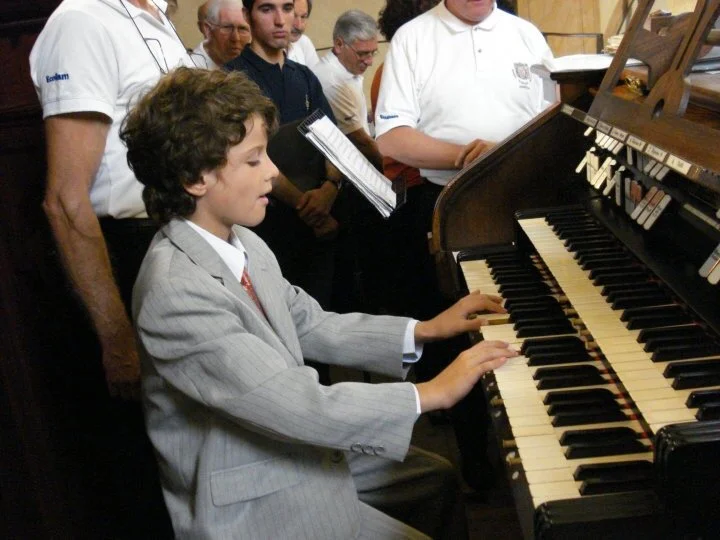Born from classical music
wedding, May 2007
Sandro D’Agaro’s pianistic journey began at the age of seven, almost naturally, as if music were a spiritual inheritance that had always belonged to him. He never met his grandfather Francesco, himself a musician, yet he has always felt his presence as an invisible guide. He is convinced that it was his grandfather, from above, who transmitted to him this profound and irreplaceable passion for music. This symbolic bond made the piano more than just an instrument: it became a thread of familial and emotional continuity, a way of conversing with what remains invisible and intangible. His first studies took shape in a small school in the Venetian area, where he began to learn the technical foundations of the instrument. From the very beginning, however, what fascinated him was not only discipline, but the evocative power of music itself. Sandro’s attraction was drawn in particular to the late nineteenth- and early twentieth-century repertoire, a period of great transformation, full of lyrical and dramatic tensions that seemed to mirror his own sensitivity. Among the composers who left the deepest mark on him are Schubert, Chopin, Schoenberg, and, above all, Rachmaninov. Each of them represented a different gateway into the inner world: Schubert with his intimacy suspended between light and melancholy; Chopin with his technical elegance and poignant lyricism; Schoenberg with his radicalism that broke the boundaries of tonality, opening up new ways of musical thought. But it was Rachmaninov who left the most indelible impression. The first time Sandro listened to the Piano Concerto No. 2, the emotion overwhelmed him to the point of tears. In that music he recognized a total humanity: drama and hope, fragility and greatness, the echo of a universal melancholy that spoke directly to his heart. Rachmaninov thus became not only a technical and compositional model, but also a spiritual guide, a companion capable of giving him a sense of belonging. His studies eventually led him to the Conservatorio “Benedetto Marcello” in Venice, a prestigious institution deeply rooted in the city’s musical tradition. Here Sandro was able to confront a more rigorous form of teaching, studying theory, harmony, and interpretation, but also the daily discipline required of any musician. Yet his vision of the piano was never reduced to academic exercise: each score was, for him, an emotional journey, a possibility to express what could not be spoken in words. His passion for Romantic and post-Romantic repertoire intertwined with a personal search for the very meaning of performance. Like Rachmaninov, Sandro believes that a pianist should not merely play notes, but evoke worlds. Music becomes a place where the performer both vanishes and asserts himself, giving the audience not simple fidelity to the score, but a lived, intimate, and unrepeatable truth. The Conservatory of Venice was also crucial because it placed him in a city where music and art have intertwined for centuries. In Venice, where the waters seem to amplify sound and the light reflects like a liquid score, Sandro developed an even deeper awareness of the bond between space, time, and music. His pianistic path, begun almost as an inherited gift, has over time become a personal and creative journey. It was not only a matter of acquiring technique or repertoire, but of building a musical identity able to converse with his broader artistic sensibility. For him, painting and music are not separate worlds: both are born from an inner impulse, both require silence and then explosion, waiting and then gesture. Today, looking back at his journey, Sandro recognizes how the piano was the first instrument to teach him the discipline of creation and the value of emotional surrender. And how the notes of Rachmaninov, Chopin, Schubert, and Schoenberg continue to live within him, transforming into colors, gestures, and visions that nourish his everyday artistic research.
